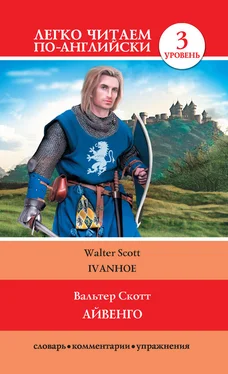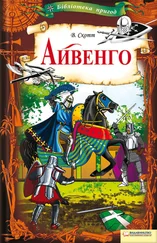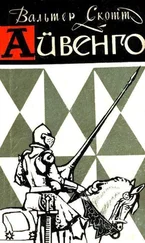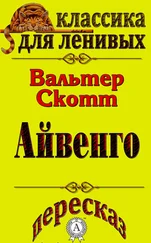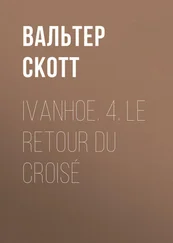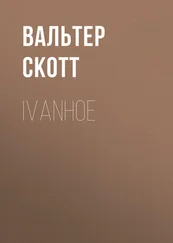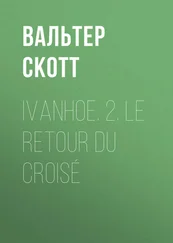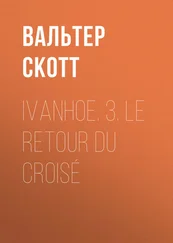There was among the followers of the Disinherited Knight a tall champion in black armour, mounted on a black horse. This knight had showed so little interest in the fight, that the spectators called him the Lazy Knight. But when this knight discovered the leader of his party in such hard circumstances, he came to his assistance immediately. He struck Front-de-Boeuf on his head, and Front-de-Boeuf rolled on the ground. The Lazy Knight then turned his horse towards Athelstane, took from the hand of the clumsy Saxon the battle-axe, and gave him such a blow that Athelstane also lay senseless on the field. After this the knight seemed to resume the laziness of his character and returned calmly to the northern end of the lists, leaving his leader to cope with Brian de Bois-Guilbert. This was no longer difficult. The Templar’s horse had lost much blood, and gave way under the shock of the Disinherited Knight’s attack. Brian de Bois-Guilbert rolled on the field, caught by the stirrup, from which he was unable to draw his foot. His antagonist jumped from his horse, waved his sword over the head of his adversary, and commanded him to surrender, when Prince John saved the Templar from confessing himself defeated by throwing down his sceptre and putting an end to the conflict.
The squires, who had found it dangerous and difficult to help their masters during the fight, now ran to the wounded.
In this way ended the tournament of Ashby-de-la-Zouche. Four knights died in the lists and more than thirty were desperately wounded, and the rest carried the marks of the conflict to the grave.
Prince John had to name the knight who had done best, and he declared that the honour of the day remained with the knight who was called the ‘Lazy Knight’. It was pointed out to the Prince, that the victory had been in fact won by the Disinherited Knight, but Prince John said that the Disinherited Knight and his party only won due to the powerful assistance of the Knight in the Black Armour.
To everybody’s surprise, however, this knight could not be found. He had left the lists and had been observed by some spectators to move in the direction of the forest. It became necessary to name another knight to receive the honours. Prince John had now no further excuse for resisting the claim of the Disinherited Knight, whom, therefore, he named the champion of the day.
Through a field slippery with blood the marshals of the lists again conducted the victor to the foot of Prince John’s throne.
“Disinherited Knight,” said Prince John, “we announce to you your right to claim and receive from the hands of the Queen of Love and Beauty the Crown of Honour, which you have justly deserved.” The Knight bowed low and gracefully, but returned no answer.
The marshals conducted the Disinherited Knight across the lists to the foot of that throne of honour which was occupied by the Lady Rowena.
On the lower step of this throne the champion was made to kneel down. Rowena, descending from her station with a graceful and dignified step, was about to place the crown which she held in her hand upon the helmet of the champion, when the marshals exclaimed with one voice, “His head must be bare.” The knight muttered faintly a few words, which showed his reluctance. From love of form or from curiosity the marshals paid no attention to this and took off the victor’s helmet, and everybody saw a well-formed face of a young man of twenty-five. This was Wilfred of Ivanhoe. His face was very pale.
When Rowena saw it, she gave a weak cry, but then, controlling emotion and making herself proceed, she placed upon the head of the victor his splendid prize.
The knight kissed the hand of the lovely Sovereign and then fainted at her feet.
Cedric, who had been struck mute by the sudden appearance of his banished son, now rushed forward to separate him from Rowena. But the marshals of the field, guessing the cause of Ivanhoe’s fall, took off his armour, and found that he was severely wounded.
* * *
The name of Ivanhoe flew from mouth to mouth and it soon reached the circle of the Prince.
“Front-de-Boeuf must prepare to give back the mansion and lands of Ivanhoe,” said De Bracy.
“Front-de-Boeuf,” replied John, “is a man more ready to swallow three mansions such as Ivanhoe, than to give one of them back”.
Waldemar Fitzurse, who went to see Ivanhoe, now returned. “The knight,” said he, “is likely to make little problem for your Highness and to leave Front-de-Boeuf in the quiet possession of his gains—he is severely wounded. And I was touched to see the grief of the Queen of Love and Beauty. This Lady Rowena suppressed her sorrow with such dignity, that it could only be discovered by her folded hands, and her tearless eye, which trembled when she looked at the body before her.”
“Who is this Lady Rowena,” said Prince John, “of whom we have heard so much?”
“A Saxon heiress of large possessions,” replied the Prior Aymer; “a rose of loveliness and a pearl of wealth.”
“We will make her happy again,” said Prince John, “by marrying her to a Norman. What do you say, De Bracy? Do you want a wife?”
“If I like her lands, my lord,” answered De Bracy, “it will be hard to disappoint me with the bride, and I will be deeply grateful to Your Highness.”
“We will not forget it,” said Prince John.
Prince John was going to give the signal for retiring from the lists, when a small scroll was put into his hand.
“Where from?” said Prince John, looking at the messenger.
“A Frenchman brought it here, who said, that he had ridden night and day to put it into the hands of Your Highness,” replied he.
The Prince looked at the inscription and the seal, and then read the note. It said: “Take care of yourself, the Devil is free!”
The Prince turned as pale as death. When he recovered from the shock, he showed the note to Waldemar Fitzurse and De Bracy. “It means,” he added, “that my brother Richard has obtained his freedom.”
“It is time, then,” said Fitzurse, “to collect our party at York. Let the archers shoot a few rounds at the target, and give them a prize. This will be enough for the Saxons, and tomorrow we will go on our way.”
“I thank you, Waldemar,” said the Prince, “you have reminded me, that I have a debt to pay to that peasant who yesterday insulted our person.”
The prize for the best archer was a horn decorated with silver. Eight yeomen presented themselves as competitors.
Prince John saw that his yeoman stood apart. “Fellow,” said Prince John, “I guessed that you were not a good archer, and now I see that you do not participate in the competition.”
“I do not want to upset your Grace in case a third prize is won by someone you dislike.”
Prince John asked, “What is your name, yeoman?”
“Locksley,” answered the yeoman.
“Then, Locksley,” said Prince John, “you will shoot in your turn, when these yeomen have showed their skill. If you win the prize, I will add twenty coins to it, but if you lose it, you will be put to shame and punished.”
“This is not fair, proud Prince,” said the yeoman, “but I will obey your command.”
A target was placed at one end of the southern avenue which led to the lists. One by one the archers, stepping forward, shot their arrows. Only ten out of twenty-four hit the target. Of the ten which hit the target, two within the inner ring were shot by Hubert, a forester in the service of Malvoisin who was called a winner.
“Now, Locksley,” said Prince John to the bold yeoman, with a bitter smile, “will you try to compete with Hubert?”
Locksley agreed.
Hubert, who, as the victor in the first trial of skill, had the right to shoot first, took his aim with great care. At length he made his shot. The arrow hit the inner ring of the target, but not exactly in the centre.
Читать дальше
Конец ознакомительного отрывка
Купить книгу
